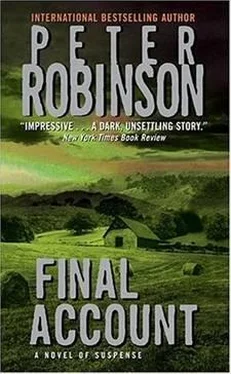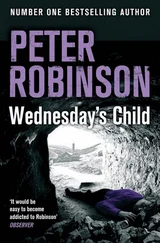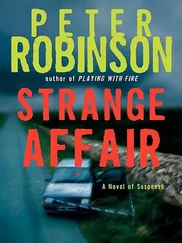“Go on, then,” Banks said. His bottle was empty now.
Rothwell brought back a Pepsi for himself and another Grölsch for Banks. His glasses had slipped down over the bridge of his nose and he pushed them back.
“So I invented Robert Calvert,” Rothwell said after a sip of Pepsi.
“Where did you get the name?”
“Picked it from a magazine I was reading at the time. With a pin. The Economist , I believe.”
“Go on.”
“I rented the flat, bought new clothes, more casual. God, you’ve no idea how strange it felt at first. Good, but strange. There were moments when I really did believe I was going mad, turning into a split personality. It became a kind of compulsion, an addiction, like smoking. I’d go to the bookie’s and put bets on, spend a day at the races, go listen to trad jazz in smoky pubs – the Adelphi, the George, the Duck and Drake – something I hadn’t done since my early twenties. I’d go around in jeans and sweatshirts. And nobody back at Arkbeck Farm ever asked where I’d been, what I’d been doing, as long I turned up every now and then in my business suit and the money kept coming in for a new freezer, a first edition Brontë, a Christmas trip to Hawaii. After a while I realized I wasn’t going mad, I was just becoming myself, returning to the way I was before I let life grind me down.
“And, sure enough, the money kept coming in. I had tapped into an endless supply, or so I thought. So I played the family role part of the time, and I started exploring my real self as Robert Calvert. I had no idea where it would lead, not then. I was just trying out ways of escape. I told Daniel Clegg one night when we’d had a few, and he thought it was a wild idea. I had to tell someone and I couldn’t tell my family or Pratt or anyone local, so why not tell my blackmailer, my confidant? He helped me get a bank account and credit card as Calvert, which he thought gave him an even stronger hold over me. He could always claim he’d been deceived, you see.”
“What about the escape?”
“You’re jumping ahead a bit, but as I’d already created Robert Calvert successfully enough, it wasn’t very difficult to go on from there and create a third identity: David Norcliffe. As you no doubt know, seeing as you’re here. Rothwell was dead, and I couldn’t go as Calvert. I had to leave him behind; that was part of the plan. So I shuffled more money into various bank accounts in various places over a period of several weeks. After all, that’s what I do best. I’ve laundered and hidden millions for Churchill and his wife.”
“How much for yourself?”
“Three or four million,” he said with a shrug. “I don’t know exactly. Enough, anyway, to last us our lifetime. And there was plenty left in Eastvale for my family. They’re well provided for in the will and by the life insurance. I made sure of that. Believe me, they’ll be better off without me.”
“What about Daniel Clegg? What about Pamela Jeffreys?”
“Pamela? What about her?”
Banks told him.
He put his head in his hands. “Oh, my God,” he said. “I would never have hurt Pamela… It wasn’t meant to be like that.”
“How did you meet her?”
Rothwell sipped some more Pepsi and rubbed the back of his hand across his brow. “I told you the Calvert thing felt very strange at first. Mostly, I just used to walk around Leeds in my jeans and sweatshirt. I’d drop in at a pub now and then and enjoy being someone else. Occasionally, I got chatting to people, the way you do in pubs. I’ll never forget how frightening and how exciting it was the first time someone asked me my name and I said ‘Robert Calvert.’ I knew it was still me – you have to understand that – we’re not really talking about a split personality here. I was Keith Rothwell, all right, just playing a part, or trying to find himself, perhaps. It gave me an exhilarating sense of freedom.
“Anyway, as I said, I used to drop in at pubs now and then, mostly in the city center or up in Headingley, near the flat. One night I saw Pamela in The Boulevard – you know, the tarted-up Jubilee Hotel on The Headrow. It seemed a likely place to meet women. They stay open till midnight on weekends and they’ve got a small dance-floor. Pamela was with some friends. They’d been doing something at the Town Hall, a Handel oratorio, or something like that. Anyway, something happened, some spark. We caught one another’s eye.
“She wasn’t with anyone in particular. I mean, she didn’t seem to have a boyfriend with her. The next time she was at the bar, I made sure I got there, too, next to her, and we got chatting. I wasn’t a great fan of classical music, but Pamela’s a down-to-earth sort of person, not a highbrow snob or anything. I asked her to dance. She said yes. We just got on, that’s all. We slept together now and then, but both of us knew it was just a casual relationship really. I don’t mean to denigrate it by saying that. We had a wonderful time. I was astounded she fancied me. Flattered. It was the first time in my entire marriage that I’d been with another woman, and the hell of it was that I didn’t feel guilty at all. She was fun to be with, and we had a great time, but we weren’t in love.”
“What came between you?”
“What? Well, we stayed friends, really. At least, I like to think we did. There was her work, of course. It’s very demanding and between us we couldn’t always be sure we could make time to get together. And Pamela was more outgoing. She wanted more of a social life. She wanted me to meet her friends, and she wanted to meet mine.”
“But you didn’t have any?”
“Exactly. And I didn’t want to get too well known around the place. It was a risk, playing Calvert, always a risk.”
“Go on. What happened next?”
“I met Julia.”
“How?”
“We met on a bus, would you believe? It had been raining, one of those sudden showers, and I was out walking without an umbrella. So I jumped on a bus into town. Then the rain stopped and the sun came out. I’d been looking at her out of the corner of my eye. She was so beautiful, like a model, such delicate, fragile, sculpted features. I imagined she was probably stuck-up and wouldn’t talk to the likes of me. Anyway, she left her umbrella. I saw it, grabbed it, and dashed after her. When I caught her up she seemed startled at first, then I gave it to her and she blushed. She seemed flustered, so I asked her if she wanted to go for a coffee. She said yes. She was very shy. It was hard to get her talking at first, but slowly I found out she was a teacher and she lived in Adel and she adored Greek history and literature.
“Do you believe in love at first sight, Mr. Banks? Do you? Because that’s what this is all about, really. It’s not just about money. It’s not just about leaving my old life behind and seeking novelty. I fell in love with Julia the moment I saw her, and that’s the truth. It might sound foolish and sentimental to you, but I have never in my life felt that way before. Bells ringing, earth moving, all the cliches. And it’s mutual. She’s everything I’ve ever wanted. When I met Julia, nothing else mattered. I knew we had to get away, find our Eden, if you like, our paradise. I had to get a new life, a new identity. Everything was in such a mess, falling apart. No one was supposed to get hurt.”
“Except Daniel Clegg.”
Rothwell banged on his chair arm with his fist. “I told you! That wasn’t my fault. I had to appear to have been violently murdered. By Daniel himself, or by someone he’d hired. And that’s exactly the way it would have been, too, if I hadn’t been tipped off and made other plans. But Julia knew nothing of that. She’s a complete innocent. She knows nothing of the things we’ve just been talking about.”
Читать дальше












